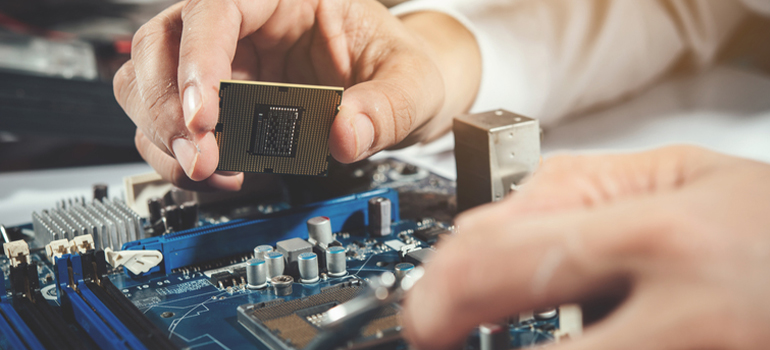Our Comprehensive Guide to Starting a Career in Computer Hardware and Networking


As technology continues to evolve, Computer Hardware remains an essential foundation for innovation, empowering us to explore the digital world with ease. From processors to peripherals, each component of computer hardware plays a critical role in ensuring the seamless operation of our devices. By gaining a deeper understanding of the intricate interplay between these elements, we can unlock a world of possibilities and become more adept problem solvers and innovators.
Through hands-on exploration and experiential learning, we can unravel the complexities of hardware architecture, master troubleshooting techniques, and hone our skills in system assembly and maintenance, setting the stage for future success in careers ranging from computer engineering to technological innovation. By cultivating a profound appreciation for the symbiotic relationship between hardware and software, we can embrace the digital age with confidence and creativity.
Computer networks are the backbone of communication in today's interconnected world of technology. They are a complex web of interconnected devices, including computers, servers, routers, switches, and wireless access points, designed to enable data transmission and resource sharing. Understanding computer networks goes beyond mere connectivity; it unveils the intricate mechanisms governing data flow, security protocols, and network architectures that underpin our digital interactions.
To gain a comprehensive understanding of computer networks, students embark on an experiential learning and hands-on exploration journey, delving deep into the realm of network topologies, protocols, and transmission technologies. They learn how to troubleshoot network issues, implement robust security measures, and optimize network design and configuration.
As students gain invaluable insights into the dynamic nature of computer networks, they emerge as adept navigators of the digital highway, equipped with the knowledge and expertise to architect resilient and scalable network infrastructures. Whether pursuing careers in network engineering, cybersecurity, or cloud computing, the foundational understanding of computer networks serves as a cornerstone for future success.
| Computer Hardware | Computer Networking |
|---|---|
| 1. Focuses on the physical components of computer systems, including devices, peripherals, and equipment. |
1. Focuses on the communication and connectivity aspects of computer systems, including the design, implementation, and management of network infrastructure. |
| 2. Involves designing, assembling, installing, and maintaining computer hardware components such as CPUs, motherboards, memory modules, storage devices, graphics cards, and input/output devices. |
2. Involves configuring, securing, and optimizing network devices such as routers, switches, firewalls, and access points to facilitate data transmission and communication between computers and devices. |
| 3. Tasks may include troubleshooting hardware issues, upgrading components, and ensuring compatibility between different hardware components. |
3. Tasks may include designing network architectures, setting up LANs and WANs, configuring network protocols, and monitoring network performance and security. |
| 4. Career opportunities include roles such as hardware engineer, systems administrator, IT support technician, and technical specialist. |
4. Career opportunities include roles such as network engineer, network administrator, network security specialist, and IT infrastructure manager. |
Computer hardware engineers create and develop computer systems and manage hardware for peripherals like printers and modems. They need technical expertise and often require high-level certification due to the nature of the work being challenging and diverse.

As a certified hardware engineer, you'll work with desktop and laptop computers, circuit boards, cabling, and other components. You may build, install, remove, update, or test computer hardware. Computer hardware engineering is a highly diversified job that can involve working on multiple projects. You may work in a technological center developing systems for various industries, or in a computer research lab. Top skills for computer engineering include coding, database knowledge, critical thinking, problem-solving, and communication.
Computer hardware engineers are an essential part of the technology industry. They design, develop, and test the physical components that are used in computing devices. As technology evolves rapidly, hardware engineers have plenty of opportunities in various industries, such as computer manufacturing, telecommunications, aerospace, and consumer electronics.
Hardware engineers collaborate closely with cross-functional teams to craft distinctive hardware solutions, engaging in every phase of product development, starting from conceptualization to product launch. Aspiring hardware engineers can explore various career paths, including:
Computer hardware engineers are well-compensated for their skills and experience. According to recent industry data, entry-level hardware engineers can expect to earn an average annual salary ranging from INR 4-6 lakhs, while mid-level professionals with several years of experience can earn upwards of INR 8-12 lakhs per year. Senior hardware engineers with specialized skills or leadership roles may command even higher salaries, with annual packages exceeding INR 15 lakhs or more, depending on the industry and location. In addition to competitive salaries, hardware engineers may receive generous benefits such as performance bonuses, stock options, and comprehensive healthcare packages, making it a financially rewarding career path for those passionate about technology and innovation.
Computer hardware engineering is a fascinating field that requires a strong passion for technology, excellent problem-solving skills, and a deep understanding of computer systems. Typically, individuals who aspire to become computer hardware engineers have a background in electrical engineering, computer engineering, or a related field. However, applicants with diverse academic backgrounds, relevant coursework, or experience in digital electronics, computer architecture, and circuit design can also pursue a career in this field.
Furthermore, specialized training programs and certifications in computer hardware engineering, offered by reputable professional organizations and educational institutions, can provide invaluable skills and knowledge for aspiring hardware engineers. To succeed in this field, a combination of theoretical knowledge, practical experience, and a genuine interest in technology are essential.
A Computer Network Engineer is a professional responsible for designing, implementing, managing, and maintaining computer networks to enable reliable and secure communication across digital environments. They have expertise in network architecture, protocols, and technologies, and troubleshoot network issues and implement upgrades to ensure optimized performance and security.

Computer Network Engineers design, implement, and maintain computer networks, troubleshoot network issues, implement security measures, plan and execute network upgrades, monitor network performance, analyse traffic patterns, and implement optimizations to enhance overall efficiency.
There is a high demand for Computer Network Engineers in various industries, which presents numerous opportunities for career growth and advancement. As organizations become increasingly reliant on digital infrastructure, skilled professionals are needed to design, implement, and maintain robust network systems.
Depending on their expertise and interests, Network Engineers can pursue diverse career paths, including roles such as Network Administrator, Systems Engineer, Network Security Specialist, or Network Architect. These roles are available across sectors such as IT services, telecommunications, finance, healthcare, and government, offering plenty of employment opportunities in both large corporations and small-to-medium enterprises.
Computer network engineers receive competitive compensation that reflects their specialized skills and experience. Entry-level positions typically offer annual salaries ranging from INR 3-6 lakhs, while mid-level professionals who have been working for several years can earn INR 6-10 lakhs or more per year.
Senior network engineers who specialize in areas such as cybersecurity or cloud networking can earn even higher salaries, with annual packages exceeding INR 10 lakhs or more. In addition, professionals with industry certifications such as Cisco CCNA, CCNP, or CCIE may enjoy higher earning potential and opportunities for career advancement. All in all, a career as a computer network engineer offers attractive compensation packages and promising prospects for professional growth and development.
If you have a passion for technology and a strong aptitude for problem-solving, then computer hardware engineering can be an excellent field for you to explore. This exciting field requires a keen interest in understanding the complexities of computer systems. Typically, a background in electrical engineering, computer engineering, or a related field is preferred for those who wish to pursue this career. However, if you have relevant coursework or experience in digital electronics, computer architecture, and circuit design, you can also consider opportunities in this field.
Additionally, specialized training programs and certifications in computer hardware engineering, offered by reputable professional organizations and educational institutions, can provide you with the necessary skills and knowledge to succeed as a hardware engineer. In summary, to thrive in this field, you need to combine theoretical knowledge, practical experience, and a genuine enthusiasm for technology.
To broaden your understanding of Network Engineer course provided by GNS Technologies, click here for additional details and resources.